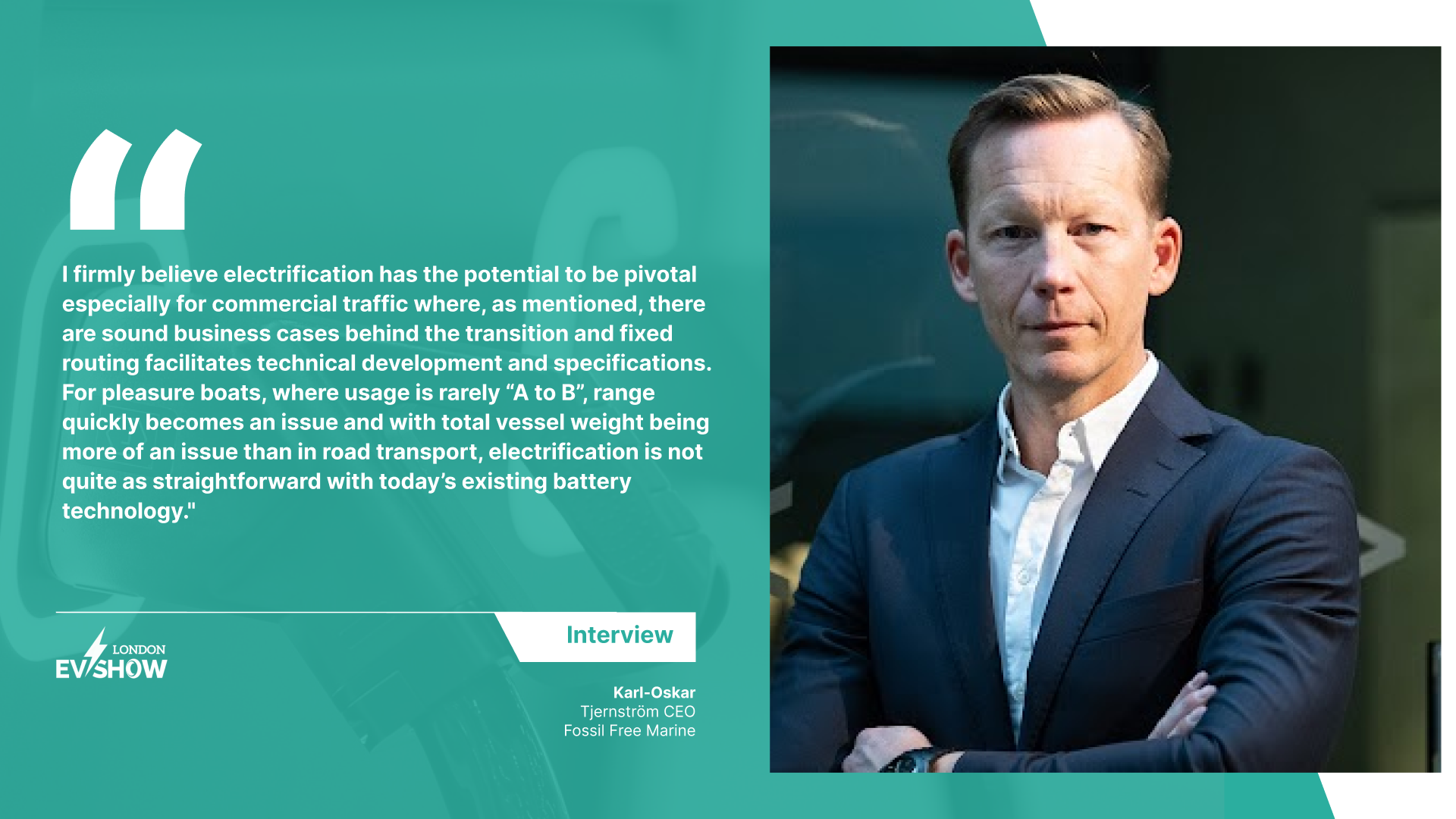Dive into the future of maritime sustainability with Karl-Oskar Tjernström, the visionary CEO of Fossil Free Marine. Our recent Q&A session unveils Karl's insights on revolutionizing the marine industry, exploring its current state, challenges, and promising opportunities.
Karl's electrifying vision emphasises how electrification can steer us towards a greener, cleaner marine sector, tackling emissions head-on. While acknowledging the hurdles of secure charging infrastructure, electric boat range, and affordability, Karl-Oskar remains steadfast in his optimism. He envisions electrification as the sector's key to decarbonization, driven by innovation and collaborative efforts.
Let us delve more into the engaging Q&A session with Mr Karl Oskar.
#LEVS: Could you provide an overview of the present state of global marine transport in reference to its associated environmental implications?
Karl-Oskar: The marine sector, often referred to as one of the “hard to abate” sectors when it comes to climate mitigation, is currently almost entirely dependent on fossil fuels. There has been a big shift in the past few years, both in terms of technology and mindset, driven by commercial traffic on one end, and pleasure boats on the other end. For commercial traffic, the business cases often make a lot of sense, and we’re seeing numerous commuter traffic and regular ferry lines being converted to electric propulsion, either as a more or less natural part of new builds, or as retrofits. For pleasure boats, replacement cycles are often very long, with big investments not least in drivelines, and with usage being much lower than cars for instance, they tend to last for several decades before being ripe for replacement. Altogether, this means that transition in the marine sector is often painstakingly slow, at least from an emissions perspective. Given the long replacement cycles I touched upon, there is an urgent need to make more sustainable fuels available for existing boats, typically linked to upgrading the fueling infrastructure, while electrification gains a foothold.
#LEVS: With the current emphasis on electrifying various modes of transport, such as cars, bikes, buses, and trucks, how pivotal do you believe is the electrification of marine transport to minimise the carbon footprint of this particular sector?
Karl-Oskar: I firmly believe electrification has the potential to be pivotal especially for commercial traffic where, as mentioned, there are sound business cases behind the transition and fixed routing facilitates technical development and specifications. For pleasure boats, where usage is rarely “A to B”, range quickly becomes an issue and with total vessel weight being more of an issue than in road transport, electrification is not quite as straightforward with today’s existing battery technology. There are a number of exciting start-ups and initiatives in this space, some of which are from Sweden and the Nordics, that are really pushing the envelope of what is possible from a technological perspective. In parallel, the first steps towards building a much-needed charging infrastructure are being taken, with Europe being at the forefront. What’s evident is that all these initiatives combine to drive awareness that boating – as we do it today – isn’t sustainable. Combined with regulatory efforts and local emissions requirements, hopefully development can be accelerated beyond the natural replacement cycles.
#LEVS: What specific technological challenges and infrastructure requirements need to be addressed in the process of electrifying marine transport?
Karl-Oskar: The key issue that we see in that regard is rolling out safe fast charging infrastructure, to match the increasingly fast development of especially commercial traffic. Standardization of charging infrastructure is a key topic that will need to be addressed, to avoid proliferation of systems serving specific vessels or carriers and we in the marine industry will need to learn from e.g heavy road traffic (buses and trucks), as the challenges are similar. Charging outputs, safety, standardization as mentioned and electric grid constraints, are obvious challenges to overcome. When taken to demanding marine environments many of these challenges are quite obviously amplified.
#LEVS: Could you please outline the primary initiatives you are currently undertaking to advance the electrification of marine transport? In the context of these initiatives, what are the major challenges you're encountering, and what strategies are you considering to overcome these hurdles?
Karl-Oskar: We have been working intensely together with partners for the last couple of years, to develop what we believe will be a solution to many of the challenges I outlined above. While a bit too early to reveal all details and specifications (watch this space, as they say), we are confident that what we will soon bring to the market will be a game-changer in marine fast charging. In addition to this much bigger and more strategic initiative, we have in parallel developed a “hybrid solution”, that allows us to safely and conveniently add additional docking space and 2 x 22 kW chargers to our existing unmanned mobile marine fuel station, allowing two electric boats to charge at the same time, without interfering with traffic to the fuel pumps. Safety is always top of the list for us, as we come from fuel infrastructure solutions, where safety is obviously paramount. This led to the decision to not go beyond 22 KW at this point in time, until there is regulatory support for higher charging outputs in the vicinity of combustible fuels.
#LEVS: In what ways do you believe events like the London EV Show can contribute to the broader goals of promoting and advancing electric vehicles and sustainable transportation?
Karl-Oskar: In an emerging industry, there is always a great need for opportunities to showcase new innovation, create an understanding of the new paradigm and ecosystem and – not least – create an opportunity for like minds to meet, share experiences, create new connections and business opportunities.

